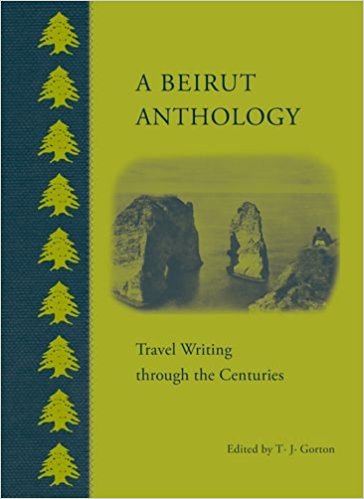
A Beirut Anthology: Travel Writing Through the Centuries
Robert W. Lebling
T. J> Gorton, ed.
2015, AUC Press, 9-789-77416-698-3, $18.95 hb.
This kaleidoscope of historical glimpses—ranging from Strabo in 140 BCE to T. E. Lawrence in 1918 and beyond—highlights one of the Middle East’s most remarkable cities. Probably founded by the Phoenicians, Beirut has been conquered by many regional and international powers over the centuries. Its legacy is not so much one of monuments but of historical and cultural connections. The city has often been a window on the East for Westerners, and a gateway to the West for people of the Middle East. In recent times, archeologists have uncovered more remnants of Beirut’s first claim to historical renown: from the third to the sixth centuries CE, it was site of the greatest law school of the eastern Roman Empire, ahead of Constantinople and Alexandria. Scholars flocked to Beirut to study law, philosophy and languages—until a devastating earthquake in 551 brought an end to the city’s era of legal and literary scholarship. But the city was rebuilt and regained its attractions. Over the centuries, it fell to more armies, those of Crusader King Baldwin of the Latin Kingdom of Jerusalem, the mighty Muslim conqueror Saladin and others. By the 19th century, Beirut had become a key stop on Europeans’ “Grand Tour” of the Holy Land, and from this period come many of the later excerpts in the book. Many of the monuments and attractions cited no longer exist, but the colorful, welcoming personality of Beirut, developed over centuries, is clear to view in these historical descriptions. Beirut’s gradual recovery from Lebanon’s vicious civil war of the 1970s-1980s shows the city’s remarkable staying power and the relentless optimism of its population.
You may also be interested in...

The Ebb and Flow of History on the Zambezi River
In tracing the past six centuries of history, historian Malyn Hewitt captures the cyclical rise and fall of the river and its people.
Naguib Mahfouz Medal for Literature Winner Gives Voice to Marginalized
“No one else will be destined to write a life story as squalid as mine, although it’s all true,” comments the elusive protagonist of Algerian author Ahmed Taibaoui’s noir novel.
Ancient Egyptians Still Have Things to Teach Us
Socrates and other Greek thinkers admired Egypt for its philosophical tradition. This new translation of a manuscript as old as the pyramids shows us why.